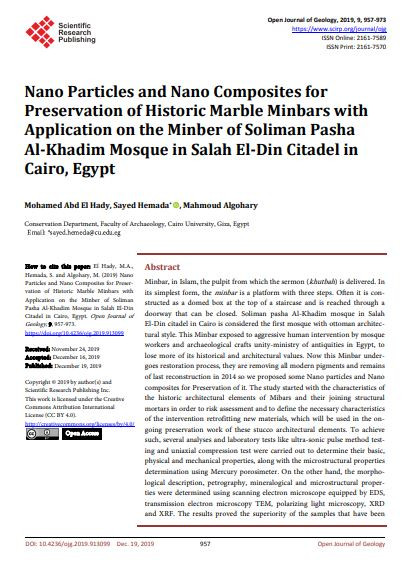
The mosque is predominantly Ottoman in layout and profile. The prayer hall adopts the Ottoman T-shaped version and is covered by a small central dome in the Ottoman style, flanked by 3 half-domes. It is preceded by a courtyard surrounded by cupola arcades. The minaret is of the same Ottoman shape with a faceted cylindrical tree surmounted by a conical floret, and located to the right of the front façade. It is elevated to a proportional height on the little mosque.
The interior reflects the exterior Ottoman shape with the dome resting on spherical pendants, and is decorated with marble cladding, inscriptions, painting, and intricate stucco.
The ground plan consists of a prayer hall covered by the central cupola surrounded by half cupolas. It is preceded by a large open square courtyard bordered by four colonnades covered with small cupolas. The prayer hall has two iwans. The first, the iwan of the qibla wall (to the south-east), houses the mihrab marked by a pointed arch and polychrome marble decoration. The upper part of this wall has four circular cartouches containing inscriptions of extracts from the Koran, the name of the sponsor and that of Sultan Soliman al-Kanouni. note that the level of the marble floor of the second iwan (north-west) is lower than that of the qibla iwan. To the southeast is the marble minbar decorated with geometric patterns and gilt foliage. A door pierced in the northeast wall leads to the interior annexes, such as the ablutions room and the water reserve. The northwest wall, facing that of the qibla, has four arched niches, one of which houses a window and another a door that opens onto the courtyard. This precedes the prayer room to the west. In front of the northwest wall is a platform (dikkat al-mouballigh) supported by 10 wooden consoles and from which the daily prayers are recited before the faithful.
Other features of the complex include a Fatimid-era sanctuary, rebuilt with its entrance embedded in the arcades of the courtyard. It was originally erected by Abu Mansur Qasta, governor of Alexandria around 1140, to house his tomb, and dedicated to Sidi Sariya, a companion of the Prophet, hence the common name of the mosque. A second courtyard above two rooms including a kuttab was built to the north of the mosque. The domes of the kuttab were covered in blue diamonds. The complex was completed with a sabil, which no longer exists, and a perimeter wall that encompasses other subsidiary yards and gardens.
Disclaimer : Mopsqpedia is a non-profit database. All images featured in the database are sourced from various references, publications, and websites related to mosque architecture. Mosqpedia does not claim ownership of any images unless explicitly stated. Images are provided solely for educational and bibliographic purposes. Mosqpedia disclaims any responsibility for copyright infringements related to the images displayed. Users are responsible for verifying copyright status and obtaining permission from original sources if they intend to reproduce, distribute, or use any image beyond fair use.
I agree to the terms outlined below:
You agree to upload and assign Mosqpedia Database the rights to use the content worldwide and in perpetuity across all current and future media platforms. Mosqpedia Database may edit, copy, adapt and translate your contribution.
The content will be distributed under the Creative Commons Attribution-Deed – Attribution-NonCommercial-NoDerivatives 4.0 International – Creative Commons
All data will be stored in line with data protection regulations.
I agree to the terms outlined below:
You agree to upload and assign Mosqpedia Database the rights to use the content worldwide and in perpetuity across all current and future media platforms. Mosqpedia Database may edit, copy, adapt and translate your contribution.
The content will be distributed under the Creative Commons Attribution-Deed – Attribution-NonCommercial-NoDerivatives 4.0 International – Creative Commons
All data will be stored in line with data protection regulations.